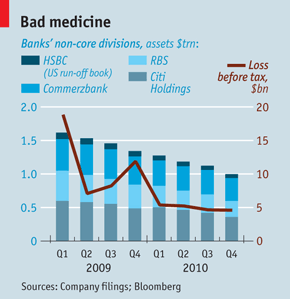Banks' dodgy assets; Taking out the trash;The lingering toxicity of banks' balance-sheets;

The job is not done yet. Two years ago the hits came mainly from securities that had to be marked to market. Now those same instruments are producing modest profits for some firms, such as Commerzbank. The bulk of losses today are from commercial-property and consumer loans. Most firms expect continued heavy write-downs this year but an improvement thereafter: RBS, for example, reckons its bad bank has now recognised some 50-75% of the impairments the assets are expected to generate. But it is possible that losses could start rising again.











